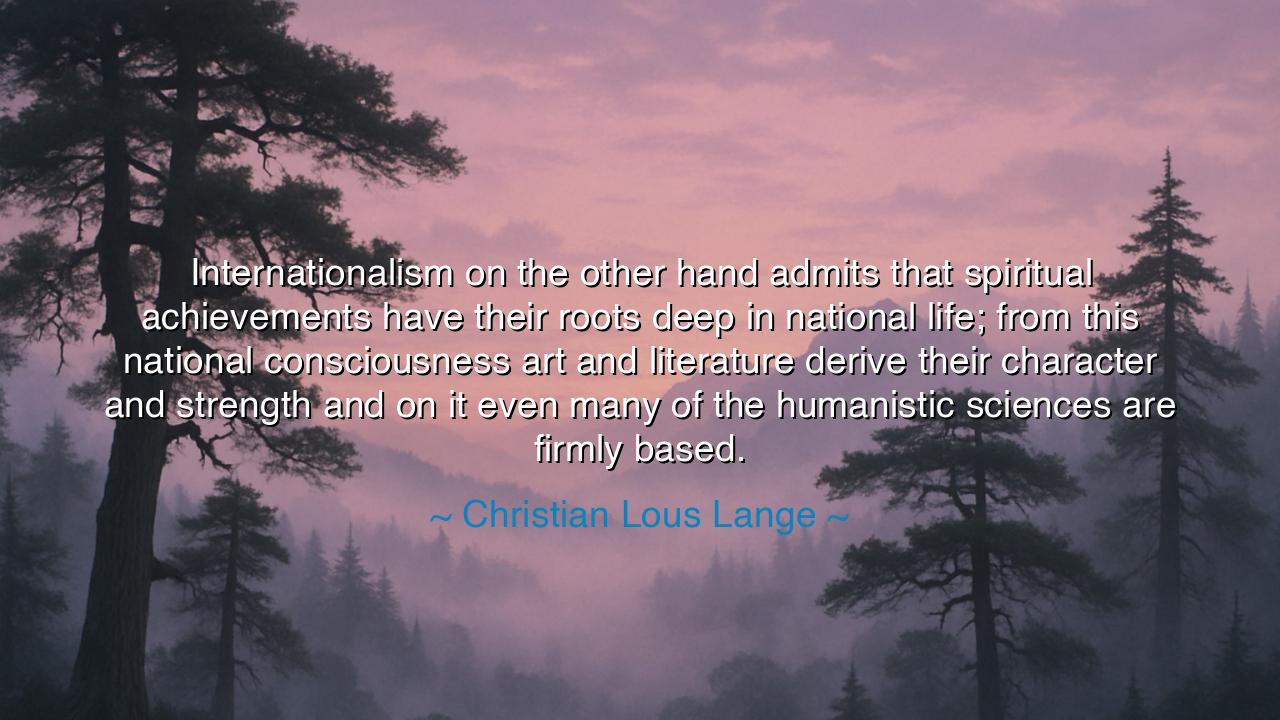
Internationalism on the other hand admits that spiritual
Internationalism on the other hand admits that spiritual achievements have their roots deep in national life; from this national consciousness art and literature derive their character and strength and on it even many of the humanistic sciences are firmly based.






Hear, O listener, the words of Christian Lous Lange, Nobel laureate and champion of peace, who proclaimed: “Internationalism on the other hand admits that spiritual achievements have their roots deep in national life; from this national consciousness art and literature derive their character and strength and on it even many of the humanistic sciences are firmly based.” In this utterance lies a harmony of opposites, for Lange teaches that what seems divided—nation and world, tradition and universality—are in truth bound together. The greatness of humanity is not born in the void, but in the soil of the homeland; yet from this soil it grows upward into the shared sky of mankind.
The origin of this thought rests in Lange’s reflections in the early twentieth century, a time when nations were torn between the pride of nationalism and the hope of internationalism. He saw the dangers of narrow pride, but also the folly of ignoring the deep power of cultural roots. For a people’s spiritual achievements—their art, their literature, their wisdom—do not come from nowhere. They rise from the earth of shared memory, of language, of songs sung in the mother tongue. Yet though they are born of the nation, they shine across borders, enriching all humanity.
Consider the tale of Dostoevsky, whose writings sprang from the dark soil of Russia’s struggles. His stories of suffering, faith, and redemption were deeply Russian, woven with the soul of his people. Yet they became treasures of the world, studied in every land, awakening every heart. Here we see Lange’s truth: the national consciousness gives birth to character, but the fruit of that birth belongs to all mankind. Without Russia, there could be no Dostoevsky; but through Dostoevsky, Russia speaks to the whole earth.
History offers another example in ancient Greece. From the soil of a small people arose tragedy, philosophy, and the sciences. These achievements were rooted in the Greek polis, in its debates, its festivals, its struggles. Yet from that small nation grew gifts that nourished the entire world. Plato and Aristotle spoke with voices grounded in their national life, but their wisdom became pillars of the humanistic sciences, supporting civilizations far beyond Hellas. Thus the local and the universal are not enemies, but companions.
The meaning of Lange’s words, then, is not to deny the nation, nor to glorify it above all, but to show its place in the greater whole. Internationalism is not rootless cosmopolitanism; it is the recognition that each nation, by tending its own garden of culture, contributes flowers to the common field of humanity. A world without nations would be bland and colorless, but a world where nations never share would be fractured and poor. True internationalism honors both root and branch, both soil and sky.
The lesson, then, is for all people: do not despise your heritage, for it is the wellspring of your strength. At the same time, do not hoard it in pride, but let it flow outward to enrich the world. The song of your nation is meant to join the chorus of mankind, not to drown it. To cherish your own culture while respecting and learning from others is the path to both peace and greatness.
Practical wisdom follows. Learn the stories, the art, the wisdom of your own people, so that you may stand firmly rooted. Yet open your heart to the achievements of other nations, seeing in them not rivals but companions in the human journey. Support the sciences, the humanities, the arts, knowing they draw nourishment from national roots but bear fruit for all. Live as a bridge, carrying the strength of your people into the fellowship of mankind.
So remember Lange’s vision: “Internationalism admits that spiritual achievements have their roots in national life; from national consciousness come the character and strength of art, literature, and humanistic sciences.” Let it guide you to honor both your roots and your wings, your nation and your world. For only in this harmony can the nations grow strong without destroying one another, and humanity rise without losing its soul.






AAdministratorAdministrator
Welcome, honored guests. Please leave a comment, we will respond soon